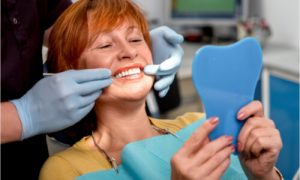A denture reline procedure is necessary, especially if you wear dentures. This dental procedure will keep your mouth functioning well and make your mouth comfortable to wear dentures. In any case, keep in mind that only a professional can perform denture relining. Continue reading the article to know more about this procedure.
What is a Denture Reline?
A denture reline helps adjust the false teeth to accommodate your mouth as your gum tissue and jaw bone certainly change. Your dentist will improve new reline material to the foundation of the denture base, so it accommodates your gums appropriately.
A denture reline procedure is helpful since it can help you to function well and improve oral health. Once you get your denture relined, they will suit more comfortably. Also, when they are fit properly, you will have an easier time eating and talking.
Since denture relines ensure that your denture fits correctly, it likewise helps advance dental hygiene. In addition, well-adjusted dentures are healthier for you since they will not cause sores that can promote infections.
What are The Reasons for Relining a Denture?
Dentures are the standard treatment for patients who lost all their natural teeth. They should be relined because your mouth changes typically over the long haul. Also, it is important to reline your dentures if they chip, crack, break or start to feel loose. Furthermore, you can ask a dentist about relining if you foster sensitive areas.
Types of Denture Relines
Hard and soft reline procedures are the most common. In any case, there are three kinds of denture relines accessible, depending on your necessities.
Hard Denture Reline
Suppose you have a complete arrangement of dentures. In that case, you will require a hard reline about once each two years. First, your dentist will eliminate a portion of the plastic from within your dentures. Next, they will apply clay to establish an impression where your denture base connects with your mouth tissue. Then the dentist will send it to the lab to substitute the clay with acrylic to make a rigid dental replacement set.
A hard reline will probably last around two years. You should maintain regular appointments with your dentist’s office to be sure.
Soft Denture Reline

There is a difference between hard and soft reline process. For example, suppose your tissue is excessively delicate, and you are getting bruises from your dentures. In that case, you may require a soft denture reline procedure on your hard denture base. For this situation, your dentist can adjust your dentures with a more suitable, pliable material such as rubber or wax rather than acrylic.
Soft liners are medical-grade delicate polymer components that a dentist applied to the tissue-fitting layer of your solid denture base. The soft materials act as a shock-absorbing pad when eating, eliminating any pain and guaranteeing better comfort.
A soft denture reline technique keeps going for a year or two, so you will require more changes.
Temporary Denture Reline
You may require a transitory reline procedure if you have gone excessively long without adjusting your dentures. You may have highly irritated gums for this situation.
Your dentist will have to reline your dentures with a sedated material to help decrease the aggravation of your gums.
A temporary denture reline is just intended to last half a month while you heal. After you mend, you will need another reline, such as hard and soft reline, or another set of dentures, depending on the condition of your oral health.
What Are the Steps in Denture Reline Procedure?
The denture reline procedure varies relying upon the kind of reline you get. Typically, it works like this:
- Your dentist will get an impression of your mouth with clay and send it to the lab.
- Then, they will use the clay to make another underside of your denture base.
- After that, your dentist will refit the false teeth to your mouth.
- If you have had a transitory reline, you will need to heal your mouth first.
- Then you will return to the dentist for a hard or soft reline and repeat phases one to three.
Your dentures usually last a couple of years, depending on the kind that you get. Therefore, it is important to regularly make an appointment with your dentist to ensure that your dentures still fit accurately.
How Long Does a Denture Reline Take?

Generally, a denture reline is a quick procedure. However, hard and soft reline techniques have different time frames. A soft denture reline can be completed in only a couple minutes. On the other hand, for a hard reline, your dentist will have to send your false teeth and impression to a lab. Hence, this procedure will take one to two days.
Additionally, a temporary denture relining will take a few weeks. Finally, take note that this is a medicated denture, so once your mouth heals, you will have to return to your dentist’s office for another reline procedure.
How Frequently Should a Denture Be Adjusted?
Your false teeth should be relined once each few years for the benefit of your oral health. How regularly relies upon the sort of dentures you have and the reline you require. In any case, it would be best to check in with your dentist occasionally to ensure that your dentures still accommodate your other natural teeth and mouth.
Moreover, cleaning your denture as you would do to your natural teeth can help them last longer. Soaking your denture with warm water can likewise help them preserve their condition.
When Should You Change Dentures Instead?
You may have to altogether replace your dentures if they break unrecoverable or if your mouth fundamentally changes. Also, you may decide to change them if they are old. Usually, a very much kept pair of dentures can last around ten years.
Your denture should keep going for quite a few years with relining. However, over the long run, your mouth changes. Your gum and bone ridges can recede. This condition can make your jaw close unexpectedly.
Once this occurs, your denture can come free, which can get awkward or even unbearable. It can likewise prompt blisters and infections. Hence, it is imperative to change the old dentures straightaway before they create dental problems. Doing this process will help keep your mouth and smile healthy.
